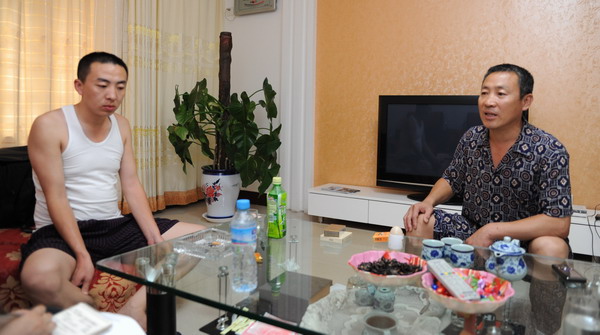Profiles
ATM 'thief': I'm still a good man at heart
By Lan Tian and Sun Ruisheng (China Daily)
Updated: 2010-08-06 08:01
 |
Large Medium Small |
|
|
LINFEN, Shanxi - After spending more than three years locked up in jail, 27-year-old Xu Ting, a former security guard, who is now out on parole, wants nothing but "a peaceful life".
But being involved in one of the most talked about "criminal" cases in recent years, Xu will have to wait a little longer before the media leave him alone.
After his release from a prison in Foshan, Guangdong province, on July 29, Xu returned to his home in Linfen, Shanxi province, by train two days later, accompanied by a crowd of journalists.
| ||||
In 2008, Xu was convicted of theft for accepting a large amount of cash from a malfunctioning ATM in Guangzhou in April 2006.
While trying to withdraw some money from his account, which had just 170 yuan ($25), Xu realized the ATM deducted only 1 yuan from his account for every 1,000 yuan it gave out.
After consulting a friend on the phone, Xu withdrew a total of 175,000 yuan ($25,840) in 171 transactions.
Xu dodged the police for more than a year before he was captured in May 2007. By then, he had squandered the money on lottery tickets, living expenses and a failed investment.
In a controversial verdict, the Intermediate People's Court of Guangzhou sentenced Xu to life in prison in November 2007, kick-starting a nationwide public debate.
Xu had confessed to his crime and quietly accepted his sentence. But many, including Xu's father, were furious at the verdict.
As China does not have a law stipulating the responsibility of a bank whose ATM malfunctions, or the category of crime that faulty ATM-related incidents should fall into, the case received extensive media attention and sparked a heated debate on the fairness of justice.
It also became an issue at the National People's Congress and Chinese People's Political Consultative Conference meetings in 2008.
Subsequently, Xu appealed to the Guangdong Higher People's Court, which ordered a retrial.
In March 2008, the Intermediate People's Court of Guangzhou convicted Xu of theft, but commuted his life sentence to five years in prison.
The court also fined Xu 20,000 yuan and ordered him to return the 175,000 yuan he withdrew from the ATM to the bank.
However, the company that was responsible for the ATM had fully compensated the bank just three days after Xu took the money.
Xu's conviction kicked off a debate about Chinese law not only across the country, but also between Xu and his father.
And the debate between the father and the son continues until this day.
Xu's father, Xu Cailiang, 53, who has been studying law ever since the conviction, has always believed in his son's innocence and blames the flawed legal system.
Xu Cailiang is disappointed that even though his son's case has become reference and study material for legal professionals and law students, it has not prompted the government to revise the relevant law.
But Xu himself is not as angry as his father.
"I always knew I was guilty, regardless of the law," Xu said. "I'm a person who takes things as they come. I accept all the consequences of my behavior. Even if I were to spend my entire life in jail, I would have accepted that."
He said he was grateful when the court commuted his life sentence to five years and rejoiced when he was released on parole based on his behavior inside prison.
"I hope I can put this chapter of my life behind me and start afresh as soon as possible," Xu said. "Discussing legislation is not my cup of tea."
Xu has also turned down his father's suggestion to write a book about his experience. "I don't even know how to write a diary," he said.
Xu plans to settle down in his hometown. "I want to find a stable job and gradually return all the money to the bank."
He is considering a few job options, like driving a cab, becoming a postman or a nurse.
"I just want a simple and peaceful life and to, maybe, marry a nice girl some day. I'm an ordinary man just like other post-1980s youngsters," Xu said. After pausing to reflect, he added: "I think I'm still a good man."


